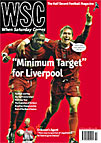 Ian Plenderleith has a look at football in Lincolnshire in the light of a new book
Ian Plenderleith has a look at football in Lincolnshire in the light of a new book
The 2002-03 season was unusually eventful for Lincolnshire football. Grimsby were relegated from Division One, both Lincoln and Scunthorpe made the Division Three play-offs and League newcomers Boston struggled through their first year after having four points docked for financial irregularities, ultimately securing their status shortly before the season’s end.
Freelance journalist Grahame Lloyd concentrates on the extraordinary year at Sincil Bank – where the club emerged from administration as relegation favourites, only to make it all the way to the play-off final – and the adverse 12 months at York Street, where a new owner and manager fought long odds from the start to ensure that a basically non-League infrastructure survived to live another year among the comparatively big swimmers of the professional game.
One of the book’s main strengths is the way it tells their stories. Lloyd thankfully eschews the lazy, day-by-day diary approach by focusing the chapters on two key staff at each club. So we not only hear the captains’, strikers’ and managers’ tales, but also find out how the unsung stalwarts of lower division football – the accountants, the commercial managers, the secretaries and the physiotherapists – made it through a year of chronic financial constraints, severe lack of experience (in Boston’s case) and everyday obstacles such as poor pitches, lack of equipment to treat injuries and the scrambling needed to sign on-loan players or merely find a decent Portakabin for staff to work in.
Lloyd conveys the sense of community at both clubs in sticking together, while telling football’s hidden stories. Did you ever wonder how much an advertising hoarding costs at a Third Division ground? Boston hadn’t, having previously taken “wood, grass seed, or a bag of sand” in return for a board. The new commercial manager had to ring firms and explain they would now be paying between £300 and £700 a season.
The book is rooted in such mundane but fascinating anecdotes. You read how ex-Lincoln boss John Beck ruined the pitch by insisting his players train on it every day as “he thought it was in far too good a condition and it would encourage teams to think they could play football on it”. Lincoln saw the consequences as a slew of visiting managers blamed the pitch for their defeats and then they had to persuade fans to cough up for a new one. Meanwhile, at Boston, plans for a fundraising calendar of the players posing almost naked went ahead despite defender Ben Chapman’s refusal to pose because of the “No Entry” sign he’d had tattooed on his right buttock.
It is also quite touching to read how two ostensible county rivals enjoyed playing each other in gate-swelled derbies and how Lincoln helped the Pilgrims before the season’s start with practical advice on administrative matters. The countless examples of co-operation and self-sacrifice at both clubs – Lincoln chairman Rob Bradley took out a £50,000 mortgage on his home to help save the club – are an inspiring reflection of the daily determination it takes to get by for teams like these.
My sole criticism is that the book could have been better edited. By the end, I felt that it was myself and not Simon Yeo who scored Lincoln’s late, play-off-securing equaliser against Torquay. And you’ll certainly never forget that Boston beat Shrewsbury 6-0 just before Christmas to end an eight-match losing streak.
However, Lloyd has pieced together in a very short time an engaging chronicle of life at the bottom end of the Football League and survived the bankruptcy of his original publisher to produce the book himself (inspired, he says, by the battling example of the two clubs he wrote about).
From WSC 204 February 2004. What was happening this month